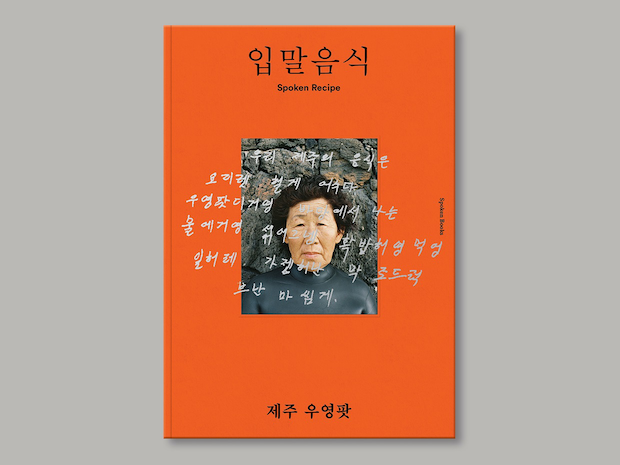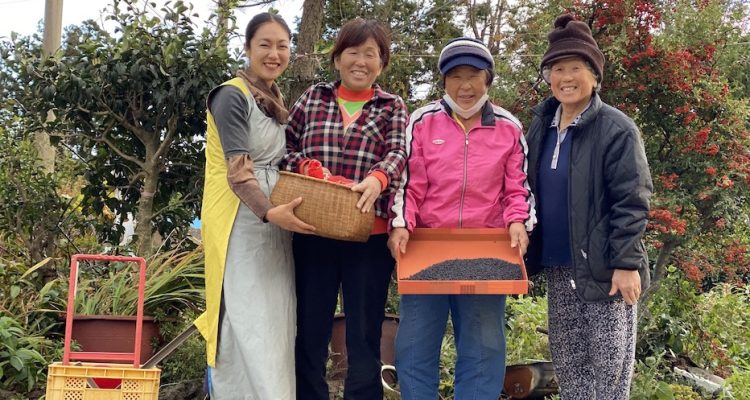Today we are here with Ha Mi Hyun, food research and founder of Spoken Company. She studies recipes that are passed by word of mouth among farmers and natives. She has travelled all over the world, from Korea to South America to collect those recipes and document them and to create experiences for people to learn about ingredients and traditional recipes.
My name is Hami, but my full name is Ha Mi Hyun. Spoken recipes founder and writer of Spoken recipe series. We collect recipes from generation to generation by word of mouth. I also develop recipes using traditional crops from farmers – we want to protect and transmit this knowledge to the next generations.
How did you interest in food start, what made you create this project
The first time I went to a temple stay for a business trip, and I very was impressed by the way monks live their lives. Temple food with their simple way of cooking by also reducing food waste really impressed me. A connection between the soil where monks grow their vegetables to cooking them respecting their characteristics, while at the same time having in mind the health aspects of eating. My interest in Korean food grew largely after this experience and decided to learn more about Korean food. It made me rethink my life and motivated me to change my hectic lifestyle as art director for commercial film.
I have also travelled to Italy in Sicily for the Slow food movement, met a lot of local producers and I was very impressed by their way of working. Stefano Ferrante slow food
What do you find interesting about rural and agricultural characteristics of Korean food?
When I decided to learn about Korean food, I started learning from Royal cuisine. But soon I realized that this way of cuisine wasn’t very “alive” for me felt somehow artificial. In Royal cuisine there is a lot of work that involves a lot of people, and mostly women had the most of the burden of the work. Moreover I didn’t want to attend schools or food academies but decided to learn directly from farmers and rural communities about recipes, ingredients that you don’t find in textbooks and are not part of the typical study curricula in cooking schools across the country.
Most of these information is passed by word of mouth. Both of my parents are farmers, and what I learn during my research really touches me because I feel it is close to my personal experience, such as for example using seasonal ingredients.
Farmers don’t have a lot of free time because of their hard work so their recipes don’t require a lot of time but have very deep flavors.
I decided to visit farmers, being in their kitchens and talk to them asking them and share recipes. We found a way to communicate with each other and how to balance traditional recipes and way of cooking and developing them towards a more modern approach.
How did the farmers react to your request to share their recipes? For them I assume their food is not special because is a simple and daily routine.
Farmer’s life is very humble. They usually think their recipes and daily life are not special or interesting. They would often feel sort of ashamed of talking about their life or they even sometimes refuse to meet me.
They don’t consider their recipes very normal, and they don’t feel like sharing them with me.
I then had to take a different approach – instead of collecting their recipes right away – i just meet them and have conversation about crops and helping them as well in the fields, making food together. After building some trust, their attitude changes and they decide to help me in my research. Build a relationship is the most important thing to gain their trust so that’s what I focus on and also show honest interest about their daily life. Since I work this way I try to apply the same dedication in my life as well, devoting time to build relationships.
Any touching story you would like to share with us?
There are many touching moments when I have met farmers, each story is different and interesting. If I have to choose one story among the many I would talk about Jeju island, most rewarding but also most difficult part of my project. As I mentioned farmers don’t have a lot of time to enjoy themselves, and this is particularly true for Jeju. It is a rough landscape and is even harder for farmers, especially for women in the history of the island. When I went to Jeju i started working with Jeju city government that wanted to collect spoken recipes from the island. We have worked for 2 years and collected spoken recipes, both seaside to inland farmfields of the island.
Jeju has a very different way of working when collecting “sea” recipe from inland recipes. I met a group of haenyeo and they usually work in the fields and then go to work in the sea – it is a very hard life and it was difficult for us to get hold of them, by waiting on the beach for them to come back or at their house. There was a lot of waiting involved to find a moment to talk with them in their busy schedule. Also another challenge is communication: they have very strong accent and the Jeju dialect is difficult to understand. At the beginning their way of speaking, since I was not used to it, seemed very rough and sounded almost like they were angry. But with time I realized that is the way they speak on the island. We would wait for haenyeo at the end of the working hours and followed them into the kitchen to see how they would cook some of the seafood they caught during the day. They might have a strong way of talking but they were very welcoming to us. We spend time in the kitchen with them, observing their cooking and making notes. When back at our accommodation with my team we would make records and write down their recipes, arranging photos etc. It was a challenging work but unforgettable memories, that made us grow more aware about their lifestyle but also more concerned about their future.
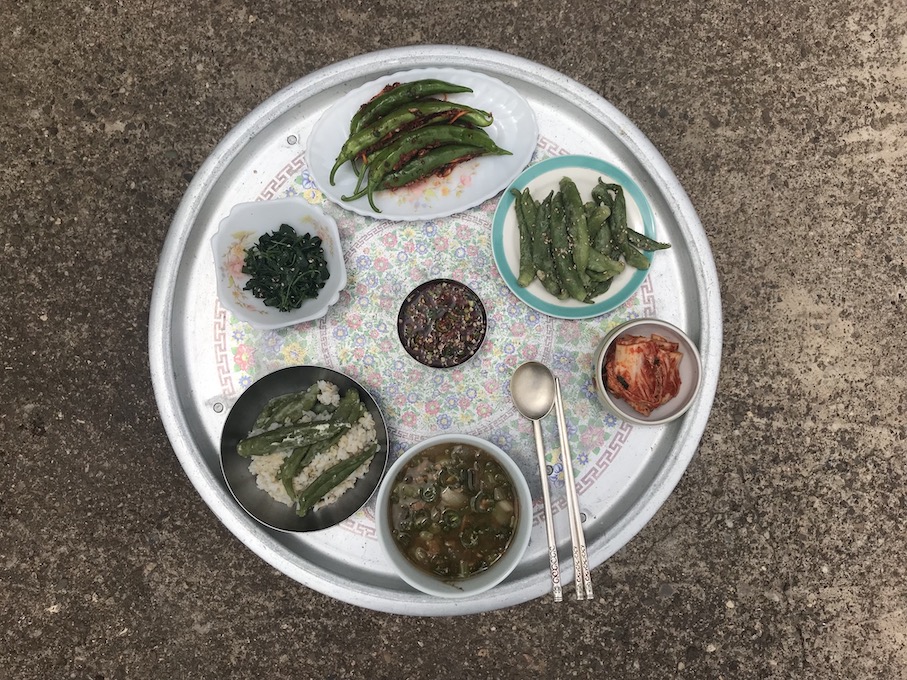
Jeju has a very special food tradition. Because, as you know, Jeju haenyeo or Jeju local people, always have a small garden (called 우영팟 uyeongpat) where they grow vegetables in a front of their house. So when they go to the ocean, they bring the sea product they catch and cooking them by mixing with products from their garden as well. So there is very special. There is spoken recipe’s view, new point: this is the different with land spoken recipes. So, Jeju spoken recipes always mix sea ingredients and garden ingredients. A haenyeo, once told me:
Oh, Jeju recipes is not recipes like land. Land people always cooking small thinly, decorated, but we never do that. We just mix.
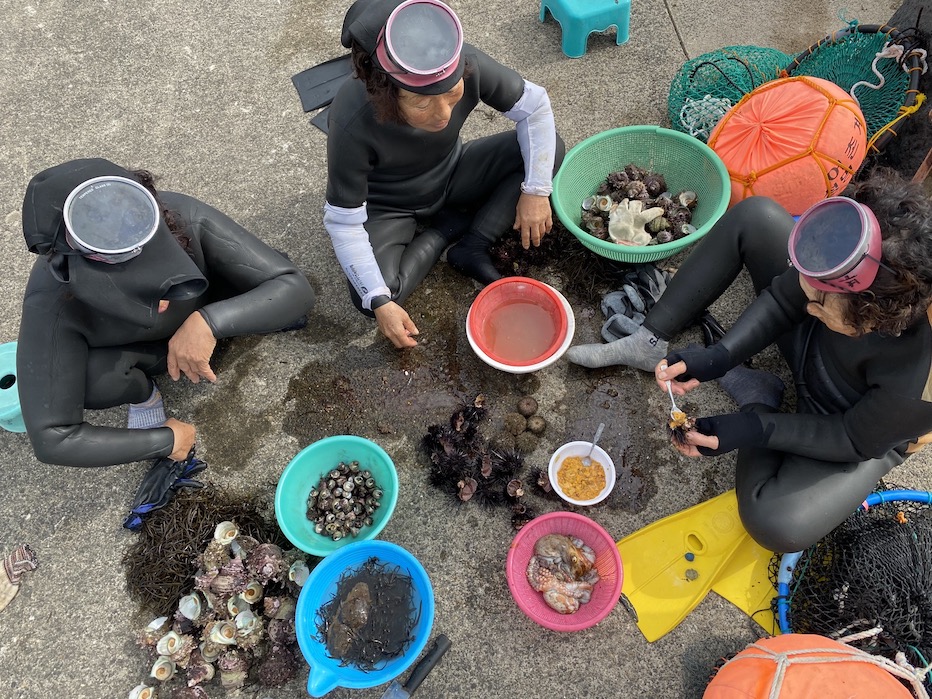
Across Korea which differences have you found and abroad? What are the most interesting things you have discovered?
I think Sicily in Italy was very interesting. Italian food and culture have some similarities with Korea. When I visited Italy I noticed these similarities: for example you have a lot of different kind of pasta. When I was in Sicily I brought some Korean ingredients with me like Deulggae (perilla seeds powder) and fermented Korean sauces (gochujang, doenjang), because I wanted to share part of my culture. I visited Stefano Ferrante’s farm – local cuisiner and farmer – and we spend a lot of time travelling throught the region, visiting food producers, farmers and we shared our food culture. For instance sujebi (hand torn noodles) are very similar to some pasta, so I made sujebi with dulggae sauce.
He made his grandma recipe, a pasta with tomato sauce and pork fat. His hand made pasta looked like sujebi. Also the tomato sauce – made with sundried tomatoes had a consistency that looked like gochujang. It is very exciting to learn such similarities between different food cultures.
I try to travel abroad 1 or 2 times per year, for researching on food cultures. It really opens my mind.
When I travelled to China, and visited a village, I also found people preparing a version of kimchi very close to the Jeoseon period recipe, when gochugaru (chilli pepper powder) hadn’t arrived in Korea yet. It felt very touching and made me feel like we are all interconnected and food cultures influence each other.
I think spoken recipes always change with generations but the simplicity of food remains.
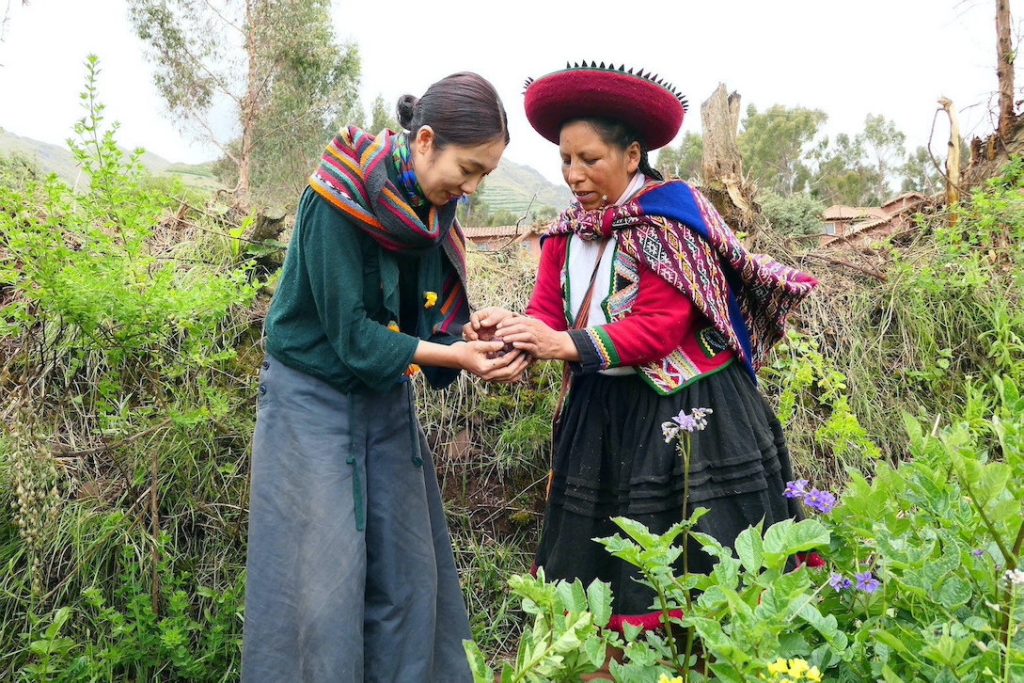
When I think about Jeju island and Haenyeo, their figure is something that sooner or later will disappear. Will it happen the same for spoken recipes?
Yes, haenyeo is a figure that is disappearing and there aren’t enough new recruits since most of young people don’t want to have this kind of lifestyle – same as for spoken recipes or traditional crops of the islands that are disappearing. Even island inhabitants don’t know these spoken recipes and traditions, so sometimes I am the one sharing information about these recipes and traditions with them.
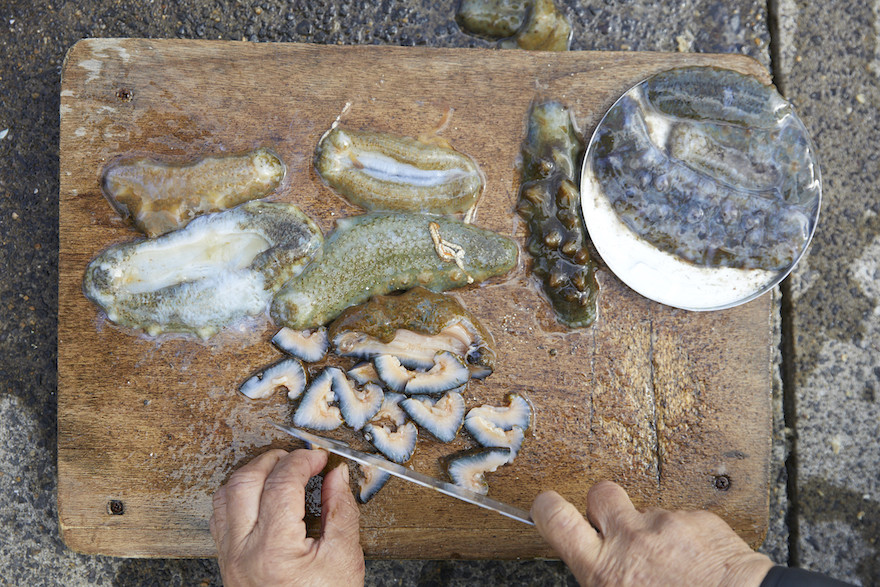
And do you have any recipes that you particular enjoy? Do you like share with us? Some ingredients?
Yes, but I’m little bit worried because is very special food. Do you know haesam (해삼)? It is sea cucumber. This ingredient and the recipe I learned in Jeju are very unusual, even for me as Korean. Haenyeo cooking is very interesting because they use a lot of ingredients from the sea with that they grow in their small garden. For example, sea cucumber, they cut it and add a splash of sesame oil. Slice a pear and add it. No salt and no sugar added. And little bit of seaweed they ad and little bit of buchu or chwi namul they added from their garden, and mix it. But the resulting taste is perfect because pear is very sweet and sea cucumber has salty flavor. When I tasted it was a very special moment to me and I thought: “Ah, there is Jeju flavor”. So for these recipe there are only four ingredients, right? Pears from the tree in the garden, sea cucumber and seaweed from the sea, a bit of seaweed from seaside, and some namul. There is four, ever within five ingredients that they have, but perfect mixed. That is very Jeju spoken recipes.
Especially Jeju is unique culture. And about another regions of Korea, have you also traveled a lot to collect the recipe in other regions of Korea, right? Like Jeolla-do. You are from in Busan, right? And do you have any memories about Busan food, for example same recipe from there?
Busan is a port city and it cuisine has been influenced by other regions of Korea or other countries. I wouldn’t say Busan food could be considered traditional Korean food for these reasons. When I was young I would often go to the international market and domestic market with my mother, because she loved cooking food for family and friends. But I never considered the food we ate at home as Korean food but just food. But later, when I studied in Europe, I reflected on what is Korean food.
Do you think, about Jeju, there is a possibility of transmit this recipes could be away for example to create a new, an alternative for haenyeo for example, to create same gastronomic tour related to this kind of recipe. What be an option for haenyeo for support them.
Yes, I’m always in the kitchen or out in the fields with local farmers and haenyeo. When we do our workshops about spoken recipe during festivals. We invite locals to try our food and share they recipes as well – an open kitchen were people can experience spoken recipes and ask questions. They often don’t know much about it and are surprised how things we found during our research are part of Korean food culture.
Do you think it will be also good added value for the internationalization of Korean food? Sharing this local and traditional recipes. Abroad the Korean food is know for being spicy or like kimch’i, so that’s like… this is deeper knowledge of Korean food.
Yes, my dream is to have the chance to share this food worldwide. So, in this October we go to Belgium for Spoken recipes workshop and we will translate our Spoken recipes book in English- This is my point. Spoken recipes are not simply Korean food but is deeper than that, they are like our history. And also, I feel that Korean food as very specific characteristic. Korean food culture is slow fast food. I mean, slow because ingredients (like kimchi, jang) take long time to prepare through the process of fermentation but cooking is always fast. Korean food is very healthy and has simple way of cooking. Also, I really want to research about similarities and differences between Korean food culture and other countries food culture. This is my current goal.
